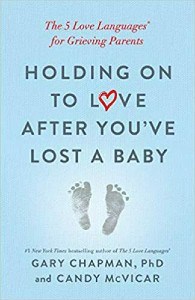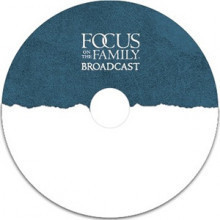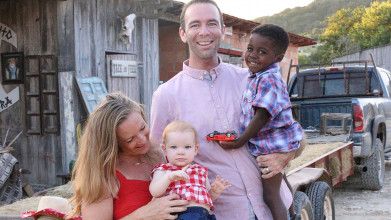John Fuller: Well, imagine that that’s your baby’s heartbeat and its clear evidence of a life growing in your womb. It’s a joyful sound of a shared love and a-a future eagerly anticipated for your family. But if that life is cut short unexpectedly, it can feel like your world has come to an end. Today on Focus on the Family, we’ll explore the tragedy of infant loss and how that can impact your life, your marriage, your faith. Your host is Focus president and author Jim Daly and I’m John Fuller.
Jim Daly: Uh, John, nothing can prepare a parent for the death of a precious child like that. Um, that’s simply not the way things are supposed to happen and the grief that couples experience, um, with the should haves, the could haves, the what ifs and the if only’s, seems insurmountable. Uh, losing a child through miscarriage, stillbirth, SIDs or some other kind of loss is devastating, and we truly hurt for that, uh, couple, that individual that has gone through that or might be going through it right now. We often don’t comprehend the depth of the pain and sorrow, the depression that can happen to the bereaved parents in that experience. And, uh, we often struggle to say the right thing or say what will help them. And today, we do wanna cover this tender subject so we can equip you to be the best friend, the best, uh, spouse you can be in that circumstance. And in fact, John, I know you and Dena experienced, uh, something in this area.
John: We had a couple of, uh, miscarriages, uh, early in, uh, the development of our family, uh, losses at about 12, 13, 14 weeks and those were really hard times. They were lonely, they were, uh, lot of shared tears and we did have a lot of folks come around and love on us. We wanna help you as a listener learn how to do that in a-a really, uh, meaningful way as you, uh, surround families who are dealing with difficulties.
Jim: Well, and that’s why, again, we’re gonna tackle the subject. It really is to help those that are grieving right now, um, to equip those who may, uh, encounter this in the future and to help us, you know, do better at being that good friend that we need to be.
John: Yeah, and we have Dr. Gary Chapman and Candy McVicar with us here in the studio today. Dr. Chapman is of course a frequent guest on this broadcast. He’s a counselor, a speaker and an author best known for, uh, his series of books The Five Love Languages. And Candy McVicar is a grief and trauma specialist who speaks and writes about infant loss. Uh, she’s the founder and CEO of Missing Grace Foundation, which provides support and resources and education for families and, uh, professional care providers in infant loss situations. And together, Candy and Gary have written a book, Holding onto Love After You’ve Lost a Baby. And we have copies of that here at focusonthefamily.com/broadcast.
Jim: Gary, welcome back to Focus. Always good to have you.
Dr. Gary Chapman: Well, thank you. It’s good to be back.
Jim: And Candy, it’s so good to have you for the first time. Thank you for being with us. Appreciate it.
Candy McVicar: Thank you. It’s a pleasure.
Jim: Yeah.
Candy: Appreciate the opportunity.
Jim: And it’s such a tough subject, um, and Candy, you have firsthand experience with infant loss. You and your husband Stephen, uh, lost a child. In fact, I believe your ministry’s named after that child. Uh, explain, uh, what happened and a little bit about your ministry.
Candy: Thank you. Um, well yeah, we were excited to have a big family. We had that number four. We wanted four children and, um, we got started right away after getting married and we got pregnant with Grace, and it was a very difficult pregnancy, lotta challenges and, um, but we just felt like we just press through and we’ll get through this and the, the prize is at the end and, um, at the last two weeks of her life, she didn’t move very much and we didn’t know it was a girl. We didn’t find out the gender at the ultrasound and so, we just knew baby’s not moving a lot and something doesn’t seem right. So, I called the doctor, in fact, seven times. I went in-
John: Seven times.
Candy: … in the last, yeah-
Jim: Right.
Candy: … in the last two weeks, so I was really concerning. There was no movement.
Jim: You know, in that context, uh, in the book, it describes that they weren’t very responsive, the doctors-
Candy: No.
Jim: … and you had this mama’s instinct that something may not be right, but it really, it was really difficult, right?
Candy: Yeah. You know, uh, that’s one of the things we teach on. We’re really big on education. Moms know best, they know their babies, they know their bodies and they need to trust that God-given intuition and I believe if they can just really become mama bears and be advocates for their babies, that will do well. Um, you just have to keep asking til you get somebody who listens. Sometimes, you know, they’re, they’re kind of in a mode and this is how they are typically doing things, but maybe your baby’s not typical and their situation needs special attention like ours did.
Jim: Let me take you back, and I appreciate the vulnerability, you and your husband, Stephen. Stephen’s in the gallery right now and it’s a pleasure to, um, meet him and to, uh, get to know him, but being a couple in this, so you’ll have to speak for both of you-
Candy: Mm-hmm.
Jim: … but in that context, uh, take us back to that ultrasound that you finally were able to receive that you talked the doctors into providing. What happened during that ultrasound?
Candy: Yeah, so on the seventh visit, they said, “All right, fine, you can have the ultrasound,” but prior to that, they would just do what’s called a doppler check.
Jim: Mm-hmm.
Candy: They would stick the doppler on and all that does is it, it’s listening for fetal tone. It’s listening for that heartbeat, and it hears both the mother’s heartbeat and the baby’s heartbeat and, um, and on the last one, I think she realized there’s not a second heartbeat, but I didn’t know well enough what the different heartbeats were, and I was new to this. And so when we got to the ultrasound, I really just knew something wasn’t right, but I just figured, “I’m gonna be rushed into a C-section or something’s gonna happen because this baby needs attention.” I had no idea that she had already passed. And so, at that ultrasound, uh, they, they just, they wouldn’t talk to us. They were totally silent. It was very awkward and strange and, um, she put the ultrasound on and did the doppler and I was asking many questions and she was not willing to answer anything, and she just got up and left the room and didn’t even say anything. And, and then the radiologist came back in and for many of us who’ve gone through this, it’s like that defining moment. It was just so horrible because the doctor just came in and she put on her glasses, looked at the ultrasound and she said, “Well, as you can see, there is no heartbeat and it is dead,” and that was it. She turned around and left the room.
Jim: Just that sterile.
John: Oh my.
Candy: Totally sterile and-
John: Hmm.
Candy: … I was calling after her. I said, “Well, what do you mean? I don’t understand what you’re saying,” and, and she turned around and she said, “It’s dead,” and she left the room. And then the stenographer stood up, turned off the machine and she backed up and she goes, “You need to leave now, and you need to go to the hospital and take care of it.” And I said, “I-I-I’m eight and a half months pregnant. I don’t understand what happened,” and she goes, “We don’t know, but you have to deliver it now.” And so, um, it was very traumatic-
Jim: My goodness.
Candy: … and very icy cold and in fact, there, there was a waiting room we had come in through and, um, there were other moms waiting to get their ultrasounds and, and as I was getting dressed, she said, um, “Can you please go out the back exit and not go through the front?” And I said, “Well, we parked right at the front,” and she said, “I don’t want your crying to upset our new moms,” and I thought-
Jim: Oh my goodness.
Candy: … (laughs) “I’m a mom. I-”
Dr. Chapman: (laughs)
Jim: Right.
Candy: And so, my husband said, “No, uh, we’re, we’re gonna walk out the front.” Um, and so we went in, and we were induced and, uh, we went through 24 hours of very difficult labor, and we didn’t have very attentive care. I think a lot of times nurses, they, they get kinda callous to this. It’s, and it’s hard for them. I think it’s very important in hospital settings that they, they really work hard to make sure they have the most compassionate staff who are in that role working with the families who go through a demise and, um, we didn’t happen to have those people with us at the time. So they were very cold to us and, um, and as I experienced really challenging labor, they said, “You know, l-labor’s hard and especially hard with a stillbirth, so you know what, you chose not to get the medication, now you’re suffering the consequences.”
John: Oh my.
Jim: Oh my gosh.
Candy: And I said, “Well, I just was hoping that if I-,” I-I think I was bargaining with God and I (laughs) was praying if I, if I go through the pain, God, will you give her back to me ’cause I do believe in a miracle-working God and I was still praying all the way to the end, maybe God would breathe life into her lungs and she would be with us.
Jim: Mmm.
Candy: And, um, we didn’t get that story, but, um, we, we delivered a perfectly healthy beautiful baby girl and she died of an umbilical cord issue, which is very common with stillbirth and, um, and we, we, we just had a very short time with her. We, we didn’t know what to do. We were very scared. It was all very foreign and strange to us and, uh, we had about four hours and, um, and then we gave her up.
Jim: Yeah.
John: Mm.
Jim: And it, it does speak to the indifference-
Candy: Mm-hmm.
Jim: … that some have about-
Candy: Mm-hmm.
Jim: … a child now-
Candy: Yeah.
Jim: … and I think abortion has played a huge role-
Candy: Mm-hmm.
Jim: … in dampening the sense of life for that baby and, uh, I’m sorry-
Candy: For sure.
Jim: … but that’s where I would lay-
John: Mm-hmm.
Jim: … the blame-
Candy: Mm-hmm.
Jim: … that some just don’t embrace the idea that babies are precious and God-given and-
Candy: Exactly.
Jim: … they are made in His image and deserve every bit of humanity that a person outside the womb would get.
Candy: Right.
Jim: But that’s, we’re reaping the, the consequences of that.
Candy: I believe that’s exactly right.
Jim: Let me move, if I can, and again-
Candy: Mm-hmm.
Jim: … I so appreciate, um, your tenderness in that and your willingness to share it and I know some people are listening that may have just gone through it or are about to go through it or went through it years ago and they’re feeling it right now-
Candy: Mm-hmm.
Jim: … but that grief afterward that night, you and Stephen are at home, and you have to talk about this, I’m sure, how did you cope with the grief just in the few days after, um, this?
Candy: Well, you’re, you’re really in shock. All of us go through a-a traumatic loss, you, you have shock that kinda carries you through. You function, but you don’t even know how you’re functioning, and it sort of feels out of body like you’re watching yourself going, “How am I doing this?” And, um, and you know, my, my thing is when I’m in pain or hurting, I’m highly alerted and awake. So, I-I went into an insomnia mode. I couldn’t sleep, which is devastating ’cause the rest would’ve been so helpful. But no matter what, even with a sleep med, it just really, I couldn’t get more than two hours of sleep-
Jim: Mm-hmm.
Candy: … and my husband’s mode is sleep (laughs).
Jim: Right.
Candy: And so I would stare at him, and I would say, “How can you sleep?” Like he just, he just when he was, you know, exhausted from the, the stress and the strife and the grief of what that caused him and watching me. You know, he, he’s my provider, my protector and he’s a amazing father. And so, for him not to be able to protect us from that was really painful for him. He felt, you know, like, “Gosh, I can’t even keep my baby safe and my wife safe.” And-
Jim: Mm-hmm.
Candy: … and so, his mode was to shut down emotionally. He went to sleep, and I would just stay awake, and I would cry and eventually, I found my way to a computer and, uh, I started reaching out to the world out there of grief and reaching out to others who had gone through a stillbirth and that was my survival link. That’s how I-
Jim: Wow.
Candy: … got through this was starting to connect with other moms and dads who had been through this before me and they were able to be a guide to help me get through and, uh, is actually how I got introduced to The Five Love Languages too.
Jim: Well and thank the Lord that you had that lifeline.
Candy: Mm-hmm.
Jim: Uh Gary, we’re right up your alley now. This, uh, issue of dealing with grief and how we do that as human beings. Um, wh-what, how do we recognize that we’re in that state and then what are some things to cope?
Dr. Chapman: Well, I think anyone who’s gone through the death of a-a stillborn, uh, baby or any death in a family for that matter, it’s a loss.
Candy: Mm-hmm.
Dr. Chapman: It’s a tremendous loss, uh, and I think, uh, the natural response first of all is we cry if, that is if we are emotional at all, we cry and we cry and we cry and, and that’s good because it is releasing some of those painful emotions. And we know that grief, uh, we work through grief best when we talk about it, that is when we get to the place where we can talk, that we talk about it and we, and we ask the questions that are in our minds and those questions are in everybody’s mind and so we ask the questions and let’s face it, they’re not always satisfactory answers that come to our mind when we say, “Why God? You know-”
Candy: Mm-hmm.
Dr. Chapman: “… why did this happen?”
Candy: Mm-hmm.
Jim: Sure.
Dr. Chapman: But it’s okay to ask the question and it’s okay to tell God how you’re feeling whether-
Candy: Mm-hmm.
Dr. Chapman: … it’s anger or hurt or disappointment or whatever. So, I think we pour out as Christians, we pour our hearts out to God-
Candy: Mm.
Dr. Chapman: … and then we also pour our hearts out to members of the family-
Candy: Yeah.
Jim: Yeah.
Dr. Chapman: … our immediate family as well as our church family and, uh, and, and so doing, if people listen to us and, and just affirm us, y-you can’t fix it (laughs) you know-
Jim: Right.
Dr. Chapman: … if you’re with the person. Y-you can’t fix it for them, but you can show empathy. You, you can-
Candy: Mm-hmm.
Dr. Chapman: … identify with them, you can acknowledge, you know, you can understand the pain and the hurt-
Jim: Yeah.
Dr. Chapman: … and all. And, and I think that’s, that’s, the primary way is processing it by talking and, uh, it takes time. I-it’s, it does not happen in two weeks or three weeks. And that’s part of the problem is sometimes we, after six months or nine months, we say, “You gotta get over this now. Life’s gotta go on,” you know, and, and, and a family member, husband and wife, you know, a husband can say that to a wife, you know-
Jim: Right.
Dr. Chapman: … “You gotta get over this now,” and, uh, she wants to get over this, but the reality is we don’t ever get over this-
Candy: Mm-hmm.
Dr. Chapman: … not when you lose a baby. Uh, you don’t ever-
Candy: That’s right.
Dr. Chapman: … get over it, but you do learn how to cope, and you learn how to go on and you learn how to trust God even when you don’t understand the why questions.
Jim: Yeah, and I, you’re making such an important point that time has to do its good work-
Dr. Chapman: Yeah.
Jim: … which is to soften, to some degree, the sting of that loss and I’m sure, Candy, that’s been your experience. But Gary, let me ask you though, um, you have something in the book called the Grief-o-meter and, uh, explain what the Grief-o-meter is and how that’s useful to us.
Dr. Chapman: This is the tendency on the part of some people to think that some deaths are less painful than other deaths. Like if you had a miscarriage at 12 weeks, that’s not as bad as carrying the baby to the end and then the baby’s born dead. You know, we distinguish and, so that we, there’s a meter. It’s not as bad down here or if you already have six children, you know, then it’s not as bad as if it’s your first child.
Jim: Yeah.
Dr. Chapman: And so, uh, or, or if it’s a 90-year-old person, we say, “Well, that’s not as bad as if they were a 50-year-old person.”
Candy: Mm-hmm.
Dr. Chapman: Death is death, you know, and if it’s your spouse or your child or anyone else, it’s painful.
Candy: Mm-hmm.
Dr. Chapman: And so, uh, one of the things that we try to emphasize in the book is that we don’t need to be putting a monitor on these things and saying, “Well, this is not as bad as, you know, something else.”
Jim: Yeah.
Dr. Chapman: Uh, we are where we are and the person who’s suffering is where they are, and we need to let them be where they are.
John: Mm.
Jim: Yeah.
John: Comparisons just aren’t helpful and that’s one response that you don’t wanna offer somebody who’s gone through this. Uh, this is Focus on the Family with Jim Daly, and our guests are Gary Chapman and Candy McVicar. They have, uh, this book called Holding onto Love After You’ve Lost a Baby and it’s a wonderful application of the five love languages for, uh, parents who are really struggling. We’ll encourage you to call us 800-A-FAMILY, uh, or go online to get your copy of the book at focusonthefamily.com/broadcast.
Jim: Gary, lemme ask you this. Uh, again, I’ve said this in previous broadcasts we’ve done together. I mean, the Lord gave you a great insight into the five love languages. I mean, that was just a spiritual, uh, awakening for so many people and it’s wonderful, um, when you as the author capture that. I-I just think it’s a brilliant moment where the Lord said, “I want this information in people’s hands,” and he chose you to speak it through. That’s an, an amazing experience. In that context though, I’m thinking of the five love languages and if you can restate them real quick, um, in this moment of grief, like Candy-
Dr. Chapman: Yeah.
Jim: … and what she and Stephen went through, does it weaken that, our, our love language or does it stress us in that area? So, as you go through it, like give us the response of calamity like this when it comes to a person who likes physical touch-
Dr. Chapman: Yeah.
Jim: … or a person who likes words of affirmation and how do we calculate a-as a caregiver, as a family member, how do we calculate that person’s love language when we’re trying to soothe their grief?
Dr. Chapman: Yeah. Well, I think, uh, for example, if you are the husband, you probably already know the wife’s love language (laughing). Hopefully, you learned it earlier.
Jim: You’re right.
Dr. Chapman: If you don’t, you should have.
Candy: Right.
Jim: Right.
John: Not too late.
Jim: Nothing like a little shame here, but no-
Candy: (laughs)
Dr. Chapman: (laughs)
Jim: But no, it’s good. I mean, it’s important. Uh, Jean’s is, uh-
Dr. Chapman: Yeah.
Jim: … affirmation by the way.
Dr. Chapman: Okay, and that’s why it’s so important to speak their love language during that time. If it’s physical touch, then just putting your arms around ’em and letting ’em cry on your shoulder or just sitting beside of them.
Candy: Mm-hmm.
Dr. Chapman: But keep this in mind also, especially in intense grief in the early stages, they may even push you away, even if physical touch is their language, they’ll say, “Please don’t, honey,” you know?
Jim: Why is that happening-
Dr. Chapman: I-I think it’s-
Jim: … if that’s their core love language?
Dr. Chapman: I think it’s because the grief is just so deep that at that-
Candy: Mm-hmm.
Dr. Chapman: … particular moment, that they just-
Jim: Huh.
Dr. Chapman: … they just wanna be alone as it were-
Jim: Yeah.
Dr. Chapman: … you know. And so, they push off sometimes people that are trying to help them.
Candy: Mm-hmm.
Dr. Chapman: Uh, but having said that, I think, as, as time goes on, after that initial, uh, is, those initial intense emotions, speaking their love language is extremely important to them and if it’s words of affirmation, just say, “Honey, I love you and I love you and I love you (laughs)-”
Candy: Mm-hmm.
Dr. Chapman: “… and I’m gonna love you no matter what happens. We’re together in this thing.” You know, just kind of affirming words to them.
Jim: Yeah.
Dr. Chapman: If it’s physical touch, yes, then, then physical touch and affirming touches to them are so important, uh, during that time.
Jim: Yeah.
Dr. Chapman: And we, we do know that this experience puts the pressure on a marriage, uh, because, uh, we don’t always understand how the other person’s responding. It puts pressure on the marriage. And so, speaking each other’s love language during this time is extremely important in meeting that deep emotional need to feel loved because when you feel loved, wherever you are, you know, “They’re there for me. Right now, I just feel like everything in my whole life has been blown up, but in the back of my mind, you’re, you’re communicating love and I know you’re there for me.”
Jim: Yeah.
Dr. Chapman: You know, and so it, it’s so important.
Jim: Candy, bringing this closer to the relationship with your spouse, you and Stephen-
Candy: Mm-hmm.
Jim: … um, speak to those, uh, important observations that you both need to be aware of. You spoke about sleep or lack thereof and that’s one thing-
Candy: Mm-hmm.
Jim: … a physical attribute, but what about the emotional, uh, pain and how do husbands and wives help each other in that regard?
Candy: Well, for us, bringing the five love languages into our relationship in relation to the grief was really impactful. In fact-
Jim: Well, how did that-
Candy: … it was a game changer.
Jim: … make a difference? Yeah.
Candy: Yeah, well, we were rubbing each other raw. You know, you’re in-, you can do great in marriage when there’s no strife or difficulty or trauma, right. And then all of a sudden, you add that, whether it’s the, a death or, you know, something hard in transition and all of a sudden, you’re, you don’t have quite the amount of buffer there. And so, what the love languages did is it brought back the buffer because we started to be more cognizant, “I need to love you in a way maybe I haven’t before and I, it’s gonna reach your core, it’s gonna reach your soul better.” And, um, and so, my husband’s love language is physical touch, words of affirmation. I’m acts of service, quality time. And so, when we knew that, in light of our grief, you know, he started to say, um, you know, “I-I’ll take care of things around the home,” and but he then honored Grace in what he did with me. Like you know, he would, he, he would put out her picture or he would-
Jim: Ah.
Candy: … write me a text or say, “I’m thinkin’ about her, our daughter today,” and, and he would, he would spend time with me, you know, emoting with me and sharing his heart with me. He would say, you know, “Is it okay that I-I let down my guard and I grieve with you?” He wanted to be strong for me and I said, “Actually, I’m, I’m very drawn to you and feel safer with you if you weep with me and if you show your emotions to me because I feel like then you’re caring with me congruently.” And so, um, you know, and then with me, just, “You’re a great dad.” Like I was watching him do the best he could to parent in wha-, in what ways we had and, um, and I would, you know, just be more aware, “I need to touch him more often.” I’m not a, as touchy-feely. And so-
Jim: Kind of the hugger.
Candy: … yeah. And so I would, you know, walk by him in the kitchen and put my hand around his waist and, and he would go, “Oh, I needed that today. You know, I just needed that touch.” I put my hand on his knee or his, you know, and I would just say, “We’re gettin’ through this together-”
John: Mmm.
Candy: “… you know? I’m still thankful we have each other.” And so, it was really just about acknowledging I was reaching a-a place I hadn’t reached necessarily before and relating-
Jim: Mmm.
Candy: … it to our grief. And so, that really was, uh, very, very helpful.
Jim: And it’s really important, something you said and, and I think people need to catch this, it had to be a mindful thing-
Candy: Mm-hmm.
Jim: … to say between you and Stephen-
Candy: Mm-hmm.
Jim: … “We’re gonna do this, this way. We’re gonna know the love languages, we’re going to apply that,” and you really, you do say that it saved your marriage.
Candy: Mm-hmm. It did.
Jim: That’s pretty powerful.
Candy: It is, and you know, so we incorporated it into our support groups and so whenever we have couples attending our group, we would say, “Okay, we want you guys to read this book. We’re gonna ask you all, as an assignment, to go home and take the, uh, the quiz, which is available at The Five Love Languages website, and you can go on there. It’s all free. You can take every one of the quizzes and find out your love languages and the link, you can look and see what your-”
Jim: Yeah.
Candy: “… you know, kinda guess what theirs is, but ask them to take it ideally and then the profile will be emailed back to you.” And, and it was so fun around the table because it brought this joy of, “You guys, we tried this and it worked,” and, and people would giggle about how, how they were doing it wrong. They’re like, “I-I just realized how I was missing the mark and now I kinda know.” And, and so there was a lot of good mar-marriage bantering of, of like, “Hey, we’re gettin’ through this you guys. This was really helpful.” So, I saw it work-
Jim: Yeah.
Candy: … and that’s a big part of why this book is just, uh, I believe in it, and I’ve had so much feedback. There’s so many people writing to us saying, “This has been so incredibly helpful.”
Jim: Yeah.
Candy: “I can’t even tell you.” One woman told me she carries it around in her purse because after her baby died this year, she said, “I-I open it up and I’m like, ‘What do I do again and how do I do this?”
John: Hmm.
Candy: And, and she just said, “This has been a lifeline. Thank you-”
Jim: Yeah.
Candy: “… so much.”
Jim: Candy, um, we’re right at the end here. I mean, the time has flown by.
Candy: It goes by so fast.
Jim: But let me, let me ask you to describe a bit of your ministry-
Candy: Mm.
Jim: … Missing Grace and what, what are you trying to do specifically?
Candy: Well, our, our ministry was based out of what we wished would’ve been available for us.
Jim: Right.
Candy: So, if it had been out there, I would’ve just gone there, and I-I did reach out to many nonprofits, and I wasn’t finding what we needed. So, it was apparent the Lord was saying, “This is what you’re going to do and how you’re gonna honor your daughter.” And so, we called it Missing Grace Foundation, missing my daughter, um, but the, the name Grace, it stands for grieve, restore, arise, commemorate and educate. And so, we’re helping people get through their grief, we’re helping them restore in their emotional, relational, physical, and spiritual health. We’re helping ’em arise out of that dark place of grief. I really believe that God gives us joy for mourning and beauty for ashes and strength for fear and, and we’re really trying to help people have hope for that. We connect them with other people who are further down the road in their grief-
Jim: Kind of that lifeline you had.
Candy: Mm-hmm. Yep.
Jim: Right.
Candy: And you know what? You can get there and we’re gonna be there for-
Jim: Yeah.
Candy: … you whether it’s on, on the phone, online or in person, um, and then, and then we’re going to help them, um, to commemorate. We really believe that if you honor your loved one, whatever that is, we all have different personalities of how we would’ve raised our kids. Also in grief, we have different ways we would honor our children-
Jim: Mm.
Candy: … whether you start a foundation or you fund a foundation or you volunteer in an organization or you create a beautiful memorial garden in your backyard or you go serve somebody in need, there’s so many ways to do something positive.
Jim: Yeah.
Candy: And then education I believe is the most important. If there’s something we can learn from our story and it can help someone else down the road, that is key-
Jim: Yeah.
Candy: … and, and so we’re, we’re, we have support groups, we have baskets that we ship out to hospitals so that everything is there in a packet that is going to help them through what they’re going through from hand and foot molding kits and the outfits and a memorial candle and books and, um resources-
Jim: Boy, that sounds well thought through.
Candy: It’s really meant to be my, “Now what?”
Jim: Yeah.
Candy: And that’s what a lot of people have written to us, they said, “I didn’t know what to do, but now I know what to do.”
Jim: Yeah, and we’ll let, uh, hopefully connect to your website and let people-
Candy: Thank you.
Jim: … link to you. Uh, Gary, let’s end here because, again, in the Christian community, it feels like we run from grief not through grief-
Dr. Chapman: Yep.
Jim: … and there are lessons that are learned in that valley. So, let me give you the last word, again, thinking of that listener, that viewer who might be going through a real tough time in their life for whatever reason, uh, but they’re going through grief right now.
Dr. Chapman: Yeah. You know, I think as you read the Bible, you see people going through grief. Read the book of Jeremiah and read the book of Job. I mean-
Candy: Mm-hmm.
Dr. Chapman: … you see them goin’ through grief and God does not condemn them for goin’ (laughs) through grief.
Jim: Yeah.
Candy: Yeah.
Dr. Chapman: Yeah, and we, we wanna deny and just, and say positive things that we think will make people feel better, but really, we just need to walk with ’em through the grief process and give-
Jim: Yeah.
Dr. Chapman: … them time to suffer and and love them in a way that’s meaningful to them, whatever, whatever that language is, uh, so that they know, “There’s people out there that are not in my immediate family even who care about me.” It’s what the church is all about is walking with people through trauma and grief.
Jim: Well, and the thing that I’ve noticed when, and Focus tries to do this every day, and you know, the connections that are made with real people-
Candy: Mm-hmm.
Jim: … people that are grateful that you are there in the gap with them and helping them and that’s what I’m sure you’re experiencing, Candy. Uh, Gary and Candy, thank you so much, uh, for-
Candy: Mm-hmm.
Jim: … sharing a very tough topic, but certainly this was filled, I hope, with, uh, the sense of hope. And, uh, I would love to get this into your hands, this book, Holding onto Love After You’ve Lost a Baby. If you can make a gift of any amount, we’ll send it to you. Think of a loved one near you. It may be a neighbor who’s going through that kind of difficulty, the loss of a child. Just keep your radar up. What an opportunity to talk with this person and to share this great message of hope with them. And if you can’t afford it, just get in touch with us. We’ll trust others will cover the cost of that, but contact us and let us know, uh, if you need this help or you know someone who needs this help.
John: Yeah, get your copy of Candy and Gary’s book when you call 800, the letter A, and the word FAMILY or stop by focusonthefamily.com/broadcast. And when you get in touch, we’ll be happy to connect you with one of our caring Christian counselors should you need to talk with someone and pray about whatever struggles you’re facing right now and we’d be happy to set up that, uh, initial consultation for you when you call 800, the letter A, and the word FAMILY. Coming up tomorrow, you’ll hear from Cynthia Wenz as she shares her heartbreaking journey of going through multiple abortions.
Preview:
Cynthia Wenz: She knew. She was very aware that, that was the taking of a life. Our children may be naïve, they may be young, but they’re not blind.
End of Preview
John: On behalf of Jim Daly and the entire team, thanks for joining us today for Focus on the Family. I’m John Fuller, inviting you back next time as we once again help you and your family thrive in Christ.






















